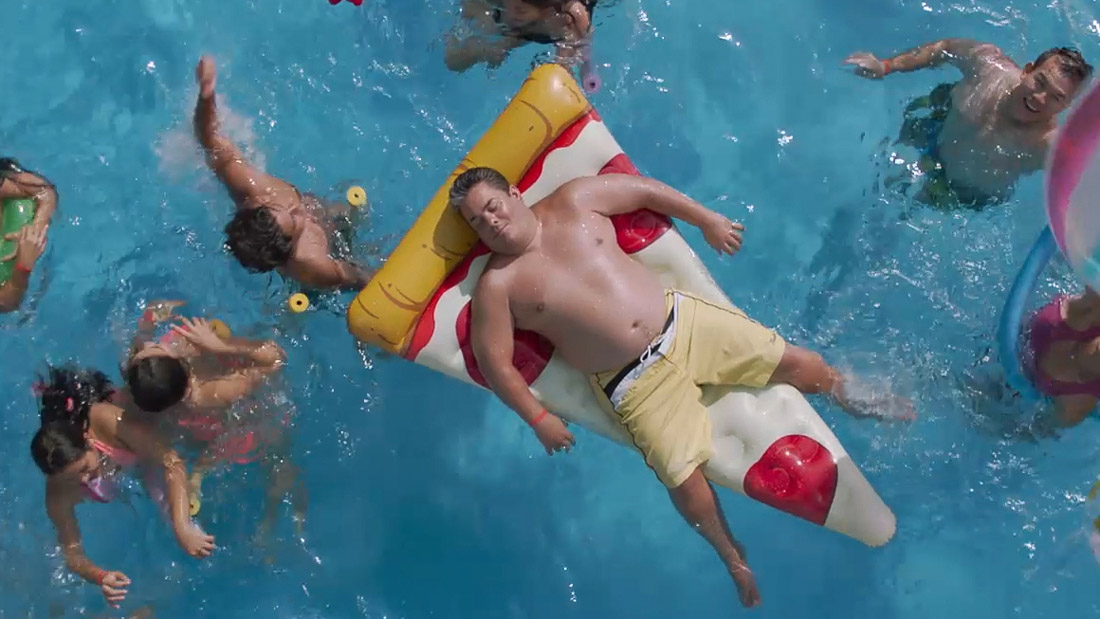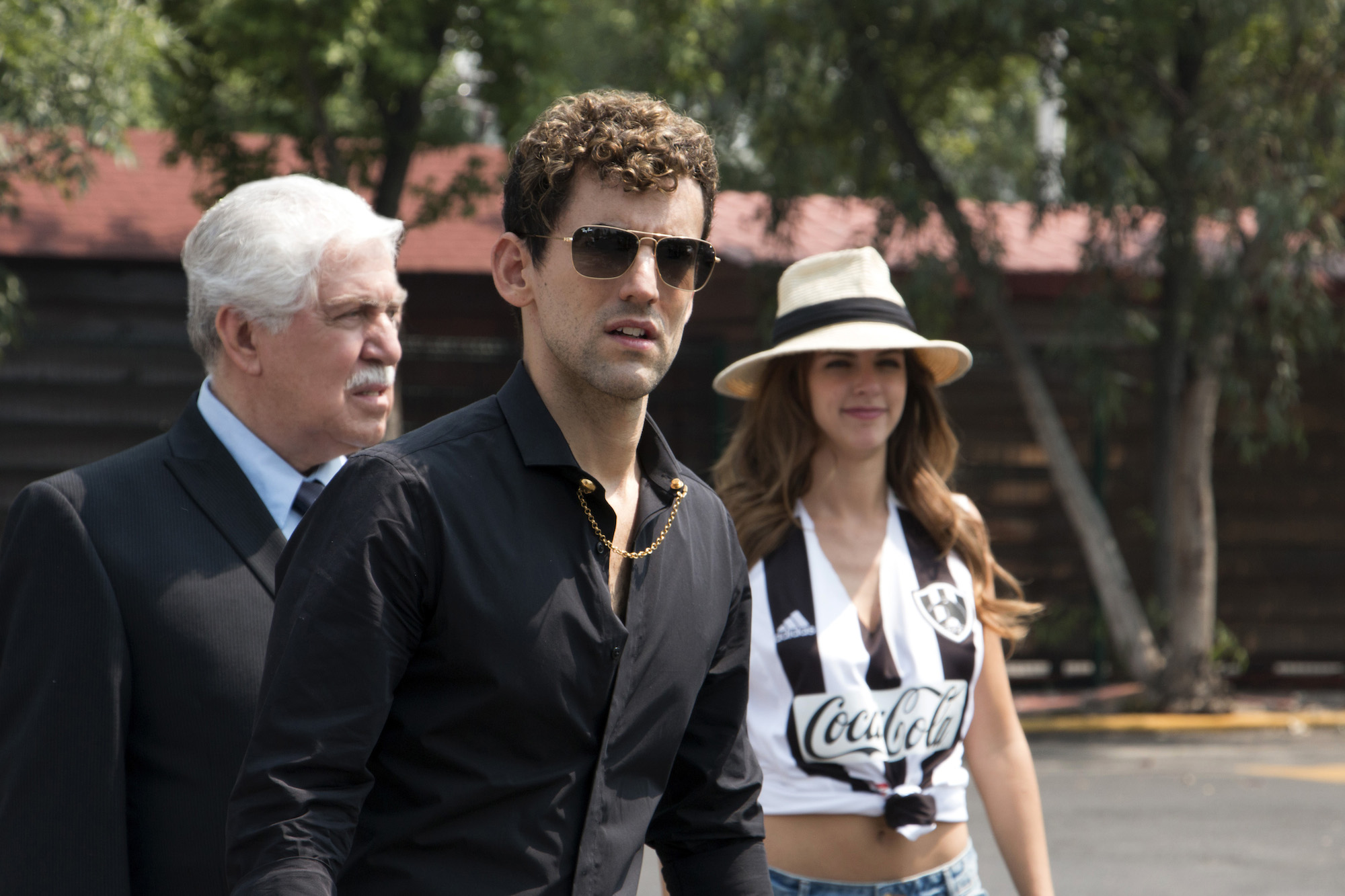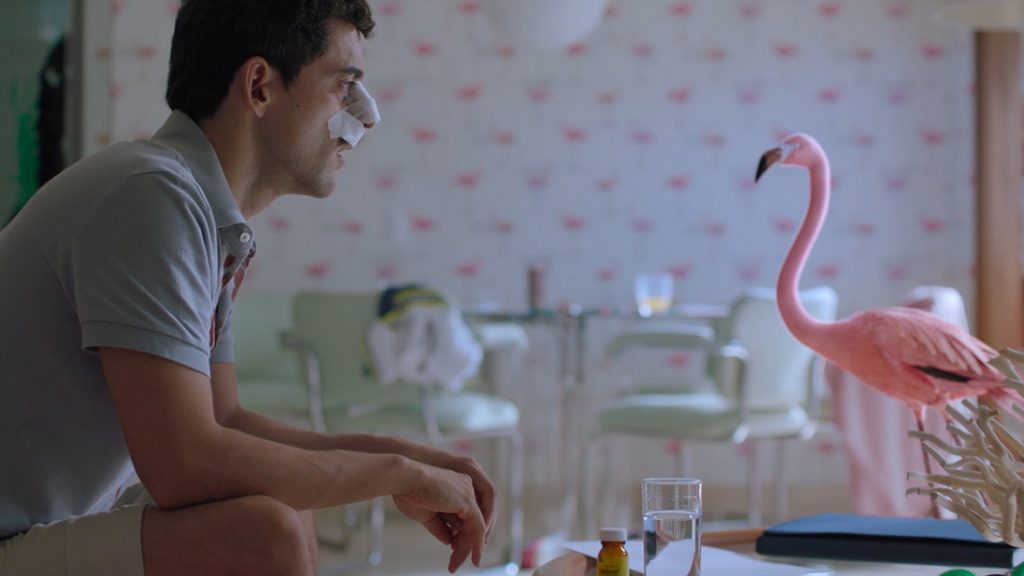Following his hilarious turn in Nosotros los Nobles, as a capricious rich kid who believes he’s lost it all, Luis Gerardo Méndez’s career flourished exponentially on both the big and small screens. The Mexican actor has been around since the early aughts, but it was that collaboration with director Gary (Gaz) Alazraki in 2013 that provided him with unimaginable exposure. Their partnership proved doubly as successful when the filmmaker brought Méndez on to the team of his Netflix series, Club de Cuervos, which is now a hugely popular production with three seasons in the bank.
Aside from playing Chava Iglesias in the futbol saga, Luis Gerardo Méndez has carved out a space in independent Mexican cinema working with up-and-coming directors such as Manolo Caro in Elvira, te daría mi vida pero la estoy usando, and larger ventures like Humberto Hinojosa Ozcariz’s Camino a Marte. This year, the charismatic performer presented a movie at the Sundance Film Festival for the first time, Sebastian Hofmann’s Tiempo compartido (Time Share), a tragicomedy where he portrays Pedro, a family man in a nightmarish vacation going against the malevolent powers of an American corporation that runs a hotel in a Mexican beach.
Tonally complex, the feature hones in on aspirations and idealized perceptions that make people vulnerable enough to fall for the false promise of a paradise or the chance to ascend the economic ladder. His character faces lots of obstacles. Trippy sequences with neon pink flamingos, Breaking Bad’s RJ Mitte as a soft-spoken villain, staff that behaves like they belong to a moneymaking cult, and plenty of physical and emotional difficulties stand in the way of a hard-working man and a meaningful time with his wife and young son.
In addition to his tech-driven stage play in which he stars alongside Diego Luna in Mexico City Privacidad, Luis Gerardo Méndez is currently developing a film project with an American studio and will return for Club de Cuervos’ fourth season. Remezcla met with the busy star at Sundance to inquire about his thoughts on voracious capitalism, whether he prefers cinema or television, and the possibility of seeing him in the director’s chair in the near future.
On How the Screenplay for Time Share Reminded Him of His Father
I thought it was a brilliant screenplay. I also thought it was very risky and very different to everything else I had read and seen in Mexican cinema. I was very moved by the themes the movie touches on. I was moved by the possibility of playing this father, this family guy, who is desperate to have this vacation, this one week a year with his loved ones. I think it’s very painful and moving to think about that. It reminds me a lot of my dad and my uncles, this middle class in Mexico that has one week a year to rest, to be with their family. These men and women are working the whole year nonstop, eight hours a day, and then they get home to take care of the children, to solve problems, and then they go to sleep. They are in this routine for months, and then when this one week they have to rest arrives, it’s taken away from them in the film. I felt that the idea that a transnational corporation or an error takes this away from them was very touching.
On the Film Being a Critique of Capitalism
Tiempo compartido is a critique of capitalism. It’s a critique on all these things they tell us we need to be happy, which it’s actually not true. Our search or exploration for meaning shouldn’t have to be about these things. I thought it was very interesting to use this hotel as a microcosm that represents everything, represents the world, that’s how the world functions. The world is governed by these dark forces, and when you watch the film, because of the music and the atmosphere, you feel like there is a negative energy around. You feel like something is wrong. It’s almost like a horror film where there are no monsters or supernatural forces. The horror is in human nature. However, you never fully understand who is in control. Of course, RJ’s character represents this American culture of transnational corporations thriving on capitalism that arrive in a place and conquer it. They arrive and conquer, arrive and conquer. But there is a higher power above his character. I think it’s brilliant the way Sebastián talks about so many different topics with a story that seems so simple: A family wants to have a vacation and everything goes wrong.
On Racism and Classism in Mexico
The job of cinema, theater, and art in general is to mirror reality so that we can reflect on it. There is a subtle social critique in the film. The characters that arrive at the hotel are white or light-skinned and the characters that work at the hotel are dark-skinned. That’s how it is in Mexico. We have to see it and recognize it so that we can realize that’s how we are unfortunately. Sometimes people dare say there is no racism in Mexico, but there is terrible classism. The film shows that this is how these companies operate, where everything is focused on “costumer service,” but the only thing they really care about is the money. The whole polite speech they use to sell this to you, which is a very American thing, is false.

On How Companies Use Personal Information to Target Our Weaknesses
I think there is also a reflection in the film about personal information. When my character receives a folder with information about his wife, that’s a chilling moment, but it’s what‘s happening today. Everything we post online, everything we send via our phones, including clinical information, can be used by companies to deny you insurance, to deny you a job, or to see if you are a good and vulnerable candidate for them to sell you a time share that you don’t need. The film has a lot of layers, and it’s very fun, but also very painful. Every time I watch it I end up with a weird feeling. I never fully understand what moves me the most about it. There is a scene near the end when Cassandra [Ciangherotti], who plays my wife, is with our son in the pool, that makes me cry every time I see it, because that’s what one is looking for. Everyone is looking for that moment of connection with their loved ones. That’s the only real thing and what we are after, and all the things we have to cross to get to that place are terrible because of the circumstances of the world we live in. It could be much easier. We could live in a cabin and grow our own food, but we don’t live in that world. We need to try to navigate this world as wisely as we can.
On Why He Thinks His Character Pedro Is a Good Guy at Heart
What I like about Pedro, this father, is that deep inside he is a good guy. He is a good guy that wants the best for his family, but the problem is that he is desperate. I like that Pedro acts as the audience’s eyes. He is the only one that has realized there is something really messed up about this place. Nobody else sees it, but he is so desperate to prove he is right that he ends up looking like the craziest one of them all. He is actually right, but at the end he loses control and is broken down until he goes insane.
On Shooting the Movie Almost Entirely at Night
It was a very particular shoot. We were locked in this hotel for about seven weeks. It was the Princess Hotel in Acapulco, which is a legendary hotel. Howard Hughes spent his final days there. It was an emblematic hotel in the 1980s. This is a movie that was almost entirely shot at night. We are near the beach, but you never see the beach. It’s a claustrophobic film. You never see the ocean in the film. You only see the pool. Sebastian wanted to show this artificial and dark environment. You would never take place at night. It was strange to shoot this film because we were working at night for about five weeks, so I think we all went a little a crazy in the process.

On What He Loves About Working on Television and Film Projects
I really enjoy making the series that I’m involved with like Club de Cuervos. I enjoyed them a lot because they allow me to get into this character that I’ve known for several years and each time I go deeper into it. As an actor, series give you the chance to do a much more surgical exploration of the character. In a sense it’s like expanded cinema. However, I’ve always had a profound love for cinema. It’s very difficult to make movies in Mexico. It’s difficult to make cinema anywhere in the world, but in Mexico particularly, it’s difficult to work in film as an actor, and when a good screenplay arrives and you have an interesting character, that’s very enjoyable. Acting in film is an artisanal type of work. It’s arduous work that last several months. There are rehearsals, and a great collaboration with the director and the other actors, then the shooting, and then waiting for the editing to be done, it’s all like handcrafting a piece of art. With a character in a series you have to be inventive not to get bored. Fortunately in Club de Cuervos we have an extraordinary team of writers and they have been able to turn things around and found funnier things each season. In my personal case, I get bored very easily, and I’m always thinking about what’s next. One of the wonders of cinema is that it’s fleeting. It’s a few months of your life in which you transform into someone else and you create a temporary family with the cast, crew, and the director because you are together 24/7 for several weeks, and then it’s over. It’s always painful because you leave that character and that temporary family. An actor’s life is very emotionally unstable because you are always falling in love with different people and then they are gone.
On the Possibility of Becoming a Director
In Club de Cuervos, I got to direct an episode last season, and I got direct another in season two. Gary Alazraki, the director and producer of the series and who also is a great friend, pushed me to do it. He told me, “Do it! I think you are ready.” Ever since I worked on my first movie, every time the director says, “Cut,” I go behind the monitor. I love watching directors and cinematographers work. I’ve always been curious about that. Some of my fondness memories as a child are of me and my brother making movies with our Playmobil toys and our camera. I’ve always been fascinated by that universe as well, but I love acting more. Gary offered me this chance to direct in Club e Cuervos and I dared to do it because I know the project very well, because I’m one of the producers, because I was there from the very beginning when the idea was born, and because I know the actors and the crew well, in a way I was very sheltered. I did it and it was an incredible time. It was like taking the blue pill in The Matrix. I loved it. When I did it I thought, “Okay, so this is how it feels to be the owner of the toys.” However, I think that to direct a film I still need a lot more preparation. I would need to take classes about specific things. I take it very seriously, and I still don’t feel ready to direct a film.
This interview was conducted in Spanish and translated to English by the author for Remezcla.







